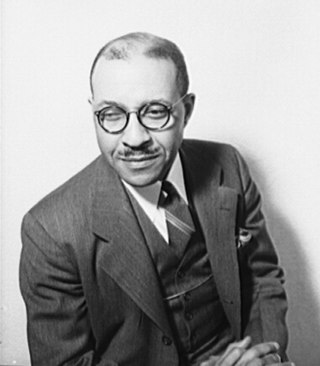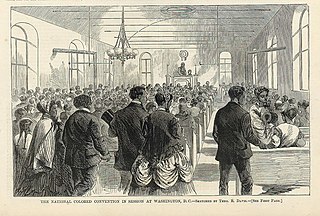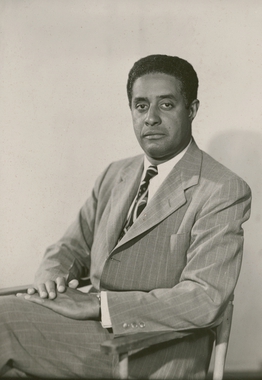Related Research Articles

William Z. Foster was a radical American labor organizer and Communist politician, whose career included serving as General Secretary of the Communist Party USA from 1945 to 1957. He was previously a member of the Socialist Party of America and the Industrial Workers of the World, leading the drive to organize the packinghouse industry during World War I and the steel strike of 1919.

The American Negro Labor Congress was established in 1925 by the Communist Party as a vehicle for advancing the rights of African Americans, propagandizing for communism within the black community and recruiting African American members for the party.
The Communist Party USA, ideologically committed to foster a socialist revolution in the United States, played a significant role in defending the civil rights of African Americans during its most influential years of the 1930s and 1940s. In that period, the African-American population was still concentrated in the South, where it was largely disenfranchised, excluded from the political system, and oppressed under Jim Crow laws.

Charles Spurgeon Johnson was an American sociologist and college administrator, the first black president of historically black Fisk University, and a lifelong advocate for racial equality and the advancement of civil rights for African Americans and all ethnic minorities. He preferred to work collaboratively with liberal white groups in the South, quietly as a "sideline activist," to get practical results.

James W. “Jim” Ford was an activist, a politician, and the vice-presidential candidate for the Communist Party USA in the years 1932, 1936, and 1940. Ford was born in Alabama and later worked as a party organizer for the CPUSA in New York City. He was also the first African American to run on a U.S. presidential ticket (1932) in the 20th century.
Frank Rudolph Crosswaith (1892–1965) was a longtime socialist politician and activist and trade union organizer in New York City who founded and chaired the Negro Labor Committee, established on July 20, 1935 by the Negro Labor Conference.

Established in 1869, the National Labor Union, more commonly known as the Colored National Labor Union (CNLU), was formed by African Americans to organize their labor collectively on a national level. The CNLU, like other labor unions in the United States, was created with the goal of improving the working conditions and quality of life for its members.
The National Negro Congress (NNC) was an American organization formed in 1936 at Howard University as a broadly based organization with the goal of fighting for Black liberation; it was the successor to the League of Struggle for Negro Rights, both affiliated with the Communist Party. During the Great Depression, the party worked in the United States to unite black and white workers and intellectuals in the fight for racial justice. This period represented the Party's peak of prestige in African-American communities. NNC was opposed to war, fascism, and discrimination, especially racial discrimination. During the Great Depression era, a majority of Americans faced immense economic problems. Many lost their jobs and as a result, were forced to live at the margins of society. The crisis highlighted inequities for many African Americans, who were unemployed at higher rates than white.
The National Negro Labor Council (1950–1955) was an advocacy group dedicated to serving the needs and civil rights of black workers. Many union leaders of the CIO and AFL considered it a Communist front. In 1951 it was officially branded a communist front organization by U.S. attorney general Herbert Brownwell.
Manning Rudolph Johnson AKA Manning Johnson and Manning R. Johnson was a Communist Party USA African-American leader and the party's candidate for U.S. Representative from New York's 22nd congressional district during a special election in 1935. Later, he left the Party and became an anti-communist government informant and witness.

During the ten decades since its establishment in 1919, the Communist Party USA produced or inspired a vast array of newspapers and magazines in the English language.
The United Public Workers of America (1946–1952) was an American labor union representing federal, state, county, and local government employees. The union challenged the constitutionality of the Hatch Act of 1939, which prohibited federal executive branch employees from engaging in politics. In United Public Workers of America v. Mitchell, 330 U.S. 75 (1947), the Supreme Court of the United States upheld the Hatch Act, finding that its infringement on the Constitutional rights was outweighed by the need to end political corruption. The union's leadership was Communist, and in a famous purge the union was ejected from its parent trade union federation, the Congress of Industrial Organizations, in 1950.
Otto Eduard Gerardus Majella Huiswoud was a Surinamese political activist who was a charter member of the Communist Party of America. Huiswoud is regarded as the first black member of the American communist movement. Huiswoud served briefly as the Communist Party's representative to the Executive Committee of the Communist International in 1922 and was a leading black Comintern functionary during the decade of the 1920s.
The Workers Party (WP) was a Third Camp Trotskyist group in the United States. It was founded in April 1940 by members of the Socialist Workers Party who opposed the Soviet invasion of Finland and Leon Trotsky's belief that the USSR under Joseph Stalin was still innately proletarian, a "degenerated workers' state." They included Max Shachtman, who became the new group's leader, Hal Draper, C. L. R. James, Raya Dunayevskaya, Martin Abern, Joseph Carter, Julius Jacobson, Phyllis Jacobson, Albert Glotzer, Stan Weir, B. J. Widick, James Robertson, and Irving Howe. The party's politics are often referred to as "Shachtmanite."

James Rupert Lawson was an African-American activist who founded the United African Nationalist Movement, an anti-imperialist lobbying group based in Harlem, advocating freedom for Africans from rule by non-Africans in the post World War II era.

Elise Johnson McDougald, aka Gertrude Elise McDougald Ayer, was an American educator, writer, activist and first African-American woman principal in New York City public schools following the consolidation of the city in 1898. She was preceded by Sarah J. Garnet, who became the first African-American woman principal in Brooklyn, New York while it was still considered a separate city. McDougald's essay "The Double Task: The Struggle for Negro Women for Sex and Race Emancipation" was published in the March 1925 issue of Survey Graphic magazine, Harlem: The Mecca of the New Negro. This particular issue, edited by Alain Locke, helped usher in and define what is now known as the Harlem Renaissance. McDougald's contribution to this magazine, which Locke adapted for inclusion as "The Task of Negro Womanhood" in his 1925 anthology The New Negro: An Interpretation, is an early example of African-American feminist writing.
African-American socialism is a political current that emerged in the nineteenth century, specifically referring to the origins and proliferation of Marxist ideologies among African-Americans for whom socialism represents a potential for equal class status, humane treatment as laborers, and a means of dismantling American capitalism. Black liberation is in line with Marxist theory, which asserts that the working class, regardless of race, has a common interest against the bourgeoisie.

Theresa Serber Malkiel was an American labor activist, suffragist, and educator. She was the first woman to rise from factory work to leadership in the Socialist party. Her 1910 novel, The Diary of a Shirtwaist Striker, is credited with helping to reform New York state labor laws. As head of the Woman's National Committee of the Socialist Party of America (SPA), she established an annual National Woman's Day which was the precursor to International Women's Day. In 1911, while on a speaking tour of the American South, she called attention to the problem of white supremacism within the party. She spent her later years promoting adult education for women workers.

The People's Voice, also known as Voice, was a newspaper based in Harlem, New York City to serve the African American community. Adam Clayton Powell Jr., a New York politician and pastor, founded the newspaper in 1942. Voice mainly focused on racial issues, local events and investigative news, but it also covered entertainment and sports. Many activists and writers contributed to Voice, including Ann Petry, Fredi Washington, and Marvel Cooke. The paper stopped publication in 1948 partly due to accusations that Voice was circulating Communist propaganda.

Ewart Gladstone Guinier was a Jamaican-American educator, lawyer, and labor leader. He was the founding chairman of Harvard University's Afro-American Studies department, now known as the Department of African and African-American Studies.
References
- 1 2 3 4 5 "Negro Labor Committee records 1925–1969". New York Public Library – Archives & Manuscripts. 1971. Retrieved 9 May 2020.
- 1 2 Gary Fink ed. Labor unions Greenwood Encyclopedia of American Institutions Westport, Connecticut, Greenwood Press 1977 p.251